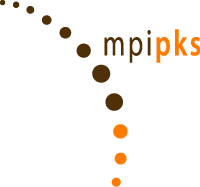
Anderson Localization and Interactions
Workshop Report
The focus of the Workshop was put on interplay of Anderson localization and many-body effects. Anderson localization, which is one of most fundamental and ubiquitous phenomena in the modern condensed matter physics, remains a vibrant research area sixty years after its discovery. Recent years have witnessed an outstanding interest in Anderson localization effects in the context of quantum many-body physics. Experimentally, it has become possible to explore localization phenomena in a variety of quantum many-body systems, including disordered semiconductors, electron glasses in amorphous systems, graphene and other Dirac materials, topological insulators, disordered superconducting films and wires, and cold-atom systems in magneto-optical traps. The Workshop involved a balance participation of experimentalists and theorists, with 80 participants in total, and collected many of the key researchers in the field. The central topics of the Workshop and the corresponding key speakers were:
Many-body localization: W. De Roeck (KU Leuven), S. Bera (IIT Bombay), S. Flach (Daejeon), U. Schneider (Cambridge), D. Abanin (Geneva), G. Pagano (Maryland), D. Luitz (MPIPKS), H. Pichler (Harvard)
Superconductor-insulator transitions: D. Shahar (Weizmann Inst.), I. Gornyi (KIT Karlsruhe), A. Fridman (Bar Ilan U), C. Strunk (U Regensburg), D. Popovic (Nat MagLab Tallahassee), T. Vojta (Missouri)
Localization and topology: H. Buhmann (Würzburg), R.-R. Du (Rice U), A. Po (MIT), M. Foster (Rice U). I. Gruzberg (Ohio)
Anderson localization in driven systems: R. Moessner (MPIPKS), S. Parameswaran (Oxford)
Anderson localization on random graphs modeling interacting systems: K. Tikhonov (KIT Karlsruhe), M. Tarzia (Sorbonne)
Disordered interacting quantum systems: A. Altland (Cologne), I. Burmistrov (Landau Inst.)
Anderson transitions: novel settings, advanced numerical approaches: G. Lemarié (Toulouse), V. Gurarie (Boulder), M. Pretko (Boulder), T. Ohtsuki (Sophia U), K. Slevin (Osaka)
One of highlights of the conference was the MPI Colloquium talk on “Probing many-body localization using ultracold atoms’ given by I. Bloch (MPI für Quantenoptik, Garching), one of pioneers of the field.
In addition to 28 invited talks, the conference program included 10 contributed talks as well as 32 posters presented at two poster sessions. Several invited talks, as well as almost all posters and contributed talks, were presented by young scientists who had an excellent opportunity to discuss their results with world-leading experts in the field. In particular, excellent talks were given by young researchers: E. Doggen (KIT Karlsruhe), S. Bera (IIT Bombay), M. Serbyn (IST Austria), D. Luitz (MPIPKS), Z. Lenarcic (Cologne), K. Tikhonov (KIT Karlsruhe), I. Protopopov (Geneva), H. Pichler (Harvard), M. Tezuki (Kyoto), X. Wan (Zhejiang), I. Khaimovich (MPIPKS).
In our view, the Workshop was a highly successful event; there are several reasons why we think so. First, it offered a possibility of very fruitful discussions of the progress in the field and future perspectives. Without exception, each talk has been followed by an intensive sequence of questions and answers as well as comments. The discussions sometimes uncovered scientific controversies but were always constructive. This has given everyone in the audience a chance to monitor the status of affairs in different directions of the field. Second, we can definitely say from our own observations that the meeting promoted many collaborations and certainly also stimulated new ones. Third, we have received feedback from many participants who fully substantiated our impression. Our colleagues emphasized that the Workshop was very useful and stimulating for them.
We would like to thank the Institute staff, and in particular Maria de Haas, for outstanding organizational support.
Ferdinand Evers and Alexander Mirlin
